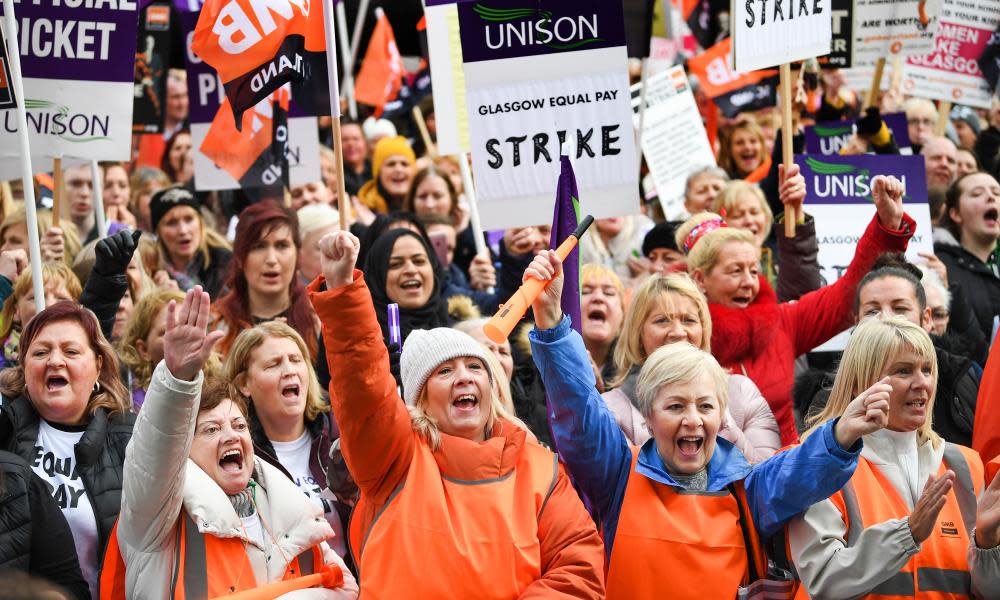Glasgow refuse workers walk out in support of cleaners' pay strike

Hundreds of male refuse workers in Glasgow have taken part in unofficial strike action to support a two-day stoppage by 8,000 mostly female cleaners in a long-running dispute over equal pay.
About 600 refuse staff, street cleaners and road workers refused to cross picket lines at depots across the city after cleaners and care workers launched a 48-hour strike that closed schools and nurseries across the city.
The stoppage followed years of legal disputes and industrial action involving the cleaners, their unions and Glasgow city council over the underpayment of about 12,000 staff in female-dominated roles dating back more than a decade.
They were paid up to £3 an hour less than council staff in male-dominated but broadly equivalent roles such as bin collecting and street sweeping. Some estimates suggest they are owed hundreds of millions of pounds in back pay.
The cleaning staff and road workers are expected to refuse to work again on Wednesday. Council officers said that meant the city’s bins would remain unemptied and streets unswept until Thursday at the earliest.
The strike is thought to be the largest yet in the UK over equal pay. Susan Aitken, the council leader, said it would “have a devastating impact and there is no need for it”.
Rhea Wolfson, a GMB Scotland union organiser, said the city’s previous Labour administration was to blame for the original pay inequality at the centre of the dispute. However, city officials were now obstructing a manifesto promise by the Scottish National party-run council to settle 12,000 outstanding pay claims.
There had been 21 meetings this year but no meaningful progress, Wolfson said, and she urged Aitken to end the impasse. “Equal pay is not a gift to be given, it is a right for our members to demand,” she said. “At the moment 8,000 of our members have gone on strike today because they have lost faith that that demand is going to be met.”

Several thousand strikers and their supporters marched on Monday morning to George Square in front of Glasgow city chambers for a short rally organised by the GMB and Unison unions.
Aitken told BBC Radio Scotland progress was being made in the talks and the council had brought many jobs at the centre of the dispute back under full council control – they were previously with the arm’s-length body Cordia – and had now harmonised pay.
“We’re working towards an agreed settlement by the end of this year [and] not any sort of lowball offer,” she said. Council officials said no new talks were scheduled, although approaches to both the GMB and Unison, the other union involved in the dispute, were expected in coming days.
Police Scotland said its officers were called to two picket lines to offer “advice and guidance” to protesters after, in at least one incident, at a depot in Shieldhall, council staff complained that entrances were being blocked. Police also went to a primary school on Baltic Street.
A police spokeswoman said: “Officers have attended a number of protests across Glasgow today. Advice and guidance has been given and there has been no issues and no arrests.”
The strike provoked a public row between Nicola Sturgeon, Scotland’s first minister, and Jeremy Corbyn, the UK Labour leader, after Corbyn and Richard Leonard, his party’s Scottish leader, tweeted messages of support for the strikers.
Corbyn and Leonard offered solidarity with the women on strike and said “it’s our duty to support them.”
I send my solidarity to women council workers in Glasgow who go on strike today to demand equal pay.
They are the carers, cleaners and caterers who are society's unsung heroes.
When they go on strike, it's our duty to support them. #GlasgowWomensStrike— Jeremy Corbyn (@jeremycorbyn) October 23, 2018
Sturgeon said she felt contempt for Labour since it was a Labour-run council that had tried to block the equal pay claim in court.
While I wish the strike wasn’t happening, I have nothing but admiration for the women involved. However, I feel contempt for a Labour Party expressing solidarity now when, in power, they took these women to court to deny equal pay. @theSNP and @SusaninLangside are working to fix. https://t.co/nbUt33HWgE
— Nicola Sturgeon (@NicolaSturgeon) October 23, 2018
The campaign group Action 4 Equality estimates that settling the outstanding claims could cost between £500m and £1bn. Those figures are disputed by the council, but Aitken has admitted it could cause it financial problems and that the council has a financial strategy to settle those claims.
Aitken said: “We’ve bent over backwards to try to meet every demand that the trade unions have made. To be honest, I don’t believe their demands are strong enough to justify action of this scale.”

 Yahoo News
Yahoo News 
